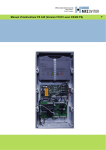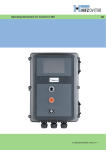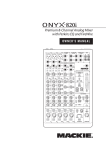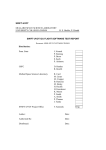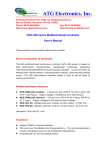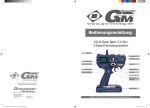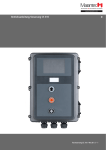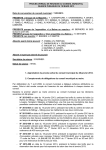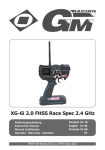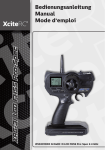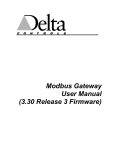Download Operating Instructions for FS 345 with FS 101 and CS300 FS
Transcript
MFZ Antriebe GmbH & Co. KG Neue Mühle 4 D-48739 Legden Operating Instructions for FS 345 with FS 101 and CS300 FS GB GB Safety advice To enable fault-free operation to be guaranteed, it is imperative that the rechargeable battery be replaced after every two years of operation. If this maintenance instruction is disregarded, the functional safety of the system and thus also the safety of buildings and persons cannot be guaranteed. To ensure that the system always functions consistently, the fire alarm function must be checked once every four weeks. In order to check at the same time that the rechargeable battery also functions correctly, the controls must be disconnected from the mains. In this way, the emergency function can be checked to ensure that the door is closed automatically by the auxiliary motor. Emergency operation is not possible if there is a fault in the safety circuit of the door operator. To avoid a deep discharge of the rechargeable battery, the battery should not be connected to the FS101 unit until the system is put into operation for the first time. If deep discharge occurs, the battery cannot be recharged again and must be replaced immediately. Page 2 of 36 – FS 345 FS101/CS300FS / Rev. 01 1 GB Table of contents 1 2 3 4 5 6 7 8 9 10 11 12 13 14 15 16 17 18 19 20 21 22 23 Table of contents Key to symbols General safety advice Overview of product Start-up the emergency operation system Start-up – gate operation system Connection examples Products drawing; emergency operation Key to FS101 / DIP switch functions Types of door operator Connection options FS 101 Adjustment options TIMER 1 Automatic operation with active CESD in emergency mode Emergency closing with door operator Door sealing function Checking the rechargeable battery and emergency operation Integrated buzzer Fault indicator and diagnostic LED Display function CS 300 FS Protective functions and charging the battery Special interconnecting Adjustment of limit switch Technical data 3 3 3 5 7 7 10 12 13 14 15 17 17 18 18 19 20 20 24 28 31 34 36 2 Key to symbols Danger of personal injury! The safety instructions must be observed! Warning! Danger to property! The safety instructions must be observed! Information Indicates a reference to other sources of information 3 General safety advice Guarantee The function and safety of the equipment is only guaranteed if the warnings and safety advice in these operating instructions are adhered to. Use fort he intended purpose The FS 345 controls are intended exclusively for controlling door systems with mechanical limit switches. FS 345 FS101/CS300FS / Rev. 01 - Page 3 of 36 GB Target group Only qualified and trained electricians may connect, program and service the controls. Qualified and skilled electricians must: - have knowledge of the general and specific safety and accident prevention regulations, - have knowledge of the relevant electrical regulations, - be trained in the use and care of appropriate safety equipment and clothing, - be capable of recognizing the dangers associated with electricity. Instructions for installation and connection - Before commencing electrical works, the system must be disconnected from the mains electricity supply and from the emergency rechargeable battery. Measures must be taken to ensure that the electricity supply remains disconnected for the duration of the works. - Local safety regulations must be observed. - Mains cables must be laid separately from control cables. Regulations and bases for testing For connecting, programming and servicing, the following regulations must be observed (the list is not exhaustive). Construction product standards - EN 12453 (Safety in use of power operated doors - Requirements) - EN 12978 (Safety devices for power operated doors and gates - Requirements and test methods) Electromagnetic compatibility (EMC) - EN 50014-1 (Emission, household appliances) - EN 61000-3-2 (Disturbances in supply systems - harmonic currents) - EN 61000-3-3 (Disturbances in supply systems - voltage fluctuations) - EN 61000-6-2 (Electromagnetic compatibility (EMC) - Part 6-2: Generic standards - Immunity for industrial environments) - EN 61000-6-3 (Electromagnetic compatibility (EMC) - Part 6-3: Generic standards - Emission standard for residential, commercial and light-industrial environments) Machinery guidelines - EN 60204-1 - EN 12100-1 Low voltage - EN 60335-1 - EN 60335-2-103 (Safety of machinery, electrical equipment of machines; Part 1: General requirements) (Safety of machinery - Basic concepts, general principles for design - Part 1: Basic terminology, methodology) (Household and similar electrical appliances - Safety) (Particular requirements for drives for gates, doors and windows) Professional association regulations D - BGR 232 (Directive for Power-driven Windows, Doors and Gates) Page 4 of 36 – FS 345 FS101/CS300FS / Rev. 01 4 GB Overview of product Product description The FS345 controls can be used in connection with fire proof door drives. The FS345 controls consist of an CS300 door control unit, an FS101 auxiliary circuit board and a rechargeable battery for the solenoid valves, magnetic clutch, DC-motor and for 24V engine brakes. In the case of fire or power cuts, the emergency rechargeable battery provides the energy for the secondary motor for closing the gate or for the engine brake for holding the gate. The fire mode is triggered by a continuous command in the fire alarm contact or is time activated if the mains power supply fails. In the case of fire, the door closes with the closing edge system deactivated, or, optionally, with the closing edge activated. Different models The following models of the FS345 controls can be supplied: - FS345 controls for dead man operation - FS345 controls for automatic operation - FS345 controls for automatic operation with the closing edge system activated in the case of fire The following housing models are available: - Housing with OPEN - STOP - CLOSE buttons - Housing with ON / OFF key switch - Housing with mains switch - Housing with emergency OFF switch The operating instructions describe the connection options and models of the FS345 controls. FS 345 FS101/CS300FS / Rev. 01 - Page 5 of 36 GB 4.1 Product drawing Page 6 of 36 – FS 345 FS101/CS300FS / Rev. 01 5 GB Start-up - the emergency operation system FS 101 The FS101 circuit board includes a charger for the rechargeable battery and a microprocessor for controlling the auxiliary drive or the engine brake. The circuit board is connected to the CS300ME door control unit in the factory and if it is purchased together with a door operator, the correct settings for that operator are also preset in the factory. All that remains to be connected is a fire alarm, and the rechargeable battery must be connected to the FS101 circuit board via a plug. To prevent deep discharge of the rechargeable battery, the battery should not be connected to the FS101 circuit board until the door is put into operation. 6 Start-up - gate operation system CS 300FS Warning! To ensure that the equipment functions properly, the following conditions must be assured: - The door is installed and operational. - The command and safety devices are installed and ready for operation. - The control unit housing with the FS345 controls is installed. - All motor connections are secured at the motor and the controls. - All components to be connected to the controls must have at least one additional isolation with a rated voltage of more than 230 V. Information: For the installation of the door and the command and safety devices, the relevant manufacturers’ instructions must be adhered to. Mains connection Danger! To guarantee that the controls function properly, the following points must be ensured: - The mains voltage must correspond to the voltage stated on the type plate. - For a permanent connection, an all-pole mains switch must be used. FS 345 FS101/CS300FS / Rev. 01 - Page 7 of 36 6.1 Start up – the mains connection and the motor 6 5 ~ V N T1 4 2 3 X12 6 L3 4 L2 PE PE PE Connection: Connection: > Connect the controls to the mains supply. > Connect the controls to the motor. > The groups of cables must be fixed together close to their relevant terminals using a cable tie. FS101 – CS 300FS (prewired) FS101-P1-1 Page 8 of 36 – FS 345 FS101/CS300FS / Rev. 01 400V / 50Hz / 3 / N / PE X1 L1 2 5 3 1 K1 Legend: Legend: K1: Contactor CLOSED K2: Contactor OPEN M1: Motor T1: Transformer X1: Terminal block for mains connection X2: Terminal block for motor L1 N K2 1 X2 U M W B1 B2 CS 300FS M1 GB GB 6.2 Start up – the limit switches Connection arrangement for limit switches (CS 300FS terminals X11, X10 and FS 101 terminals X03, X05) 1 limit switch OPEN limit switch CLOSE 3 additional limit switch CLOSE 4 additional limit switch OPEN 5 Thermal protection motor 6 emergency operation (opener) 7 safety limit switch CLOSE 8 safety limit switch OPEN 2 * factory provided: prewired ** factory provided: prewired if delivered with drive The limit switches (excluding the additional limit switch) are analyzed by the FS101 circuit board and the values are passed on to the CS300FS circuit board. The allocation of terminal X11 (limit switch) was changed in relation to the allocation of terminal of CS300FS. This must be considered during back fitting. FS 345 FS101/CS300FS / Rev. 01 - Page 9 of 36 GB 7 Connection of command and safety devices for normal door operation X3 CS300FS Command and safety devices can be connected via terminals X3 and X4. 7.1 Connection examples for command devices, terminal block X3/CS 300FS Page 10 of 36 – FS 345 FS101/CS300FS / Rev. 01 7.2 Connection of safety devices X4/CS 300FS GB Terminal block X4 (8,2 kOhm safety edge device) Terminal block X4 (for opto-electronic safety edge device) Terminal block X4 (for pneumatic safety edge device – DW) * only effective in down direction FS 345 FS101/CS300FS / Rev. 01 - Page 11 of 36 GB 8 Product drawing of circuit board FS101 and rechargeable battery Page 12 of 36 – FS 345 FS101/CS300FS / Rev. 01 9 GB Key to FS101 circuit board X01/ X02 X03 X04 X05 X06 X07 X08 X09 X10 +-AKKU Power supply 230V / PE Limit switch connections Outputs for the auxiliary motor, brake, auxiliary relay Activation of the CS 300FS circuit board Fire alarm connection Potential-free output for fault indicator Potential-free output for fire alarm Potential-free output for closing edge device Input, external 24 V Terminal block for battery pack Time 1 Time 2 S303 Reset Test F200 ON Time-controlled closing if mains power supply fails Timing element for door seal function DIP switches Button – switch off buzzer Button for testing emergency operation 3.15 A fuse for battery charger button K04 K05 K06 K07 K08 K09 K10 K11 K12 Relay secondary motor Relay engine brake Relay OPEN / CLOSE command Relay limit switch OPEN Relay limit switch CLOSE Relay Stop Relay Function / Error Relay Emergency mode Relay Closing edge FS 345 FS101/CS300FS / Rev. 01 - Page 13 of 36 GB 9.1 DIP switch functions DIP switch: 1 ON 1 OFF 2 ON 2 OFF 3 ON 3 OFF 4 ON 4 OFF 5 ON 5 OFF 6 ON 6 OFF Door operator types FT + (HY)* Door operator types FDF + FTA Fire alarm as normally closed contact Fire alarm as normally open contact Emergency closing with 400V AC / 24 VDC Emergency closing with 24V DC With CESD in emergency operation Without CESD in emergency operation Door closes if a fault occurs Door remains open if a fault occurs (Door operator types HY)* Door operator types FT When making changes to the DIP switch settings, the following procedure must be observed: 1. Switch off the mains voltage 2. Switch off the rechargeable battery voltage 3. Change the DIP switch position as required 4. Switch on the rechargeable battery voltage 5. Switch on the mains voltage * only with version HY 10 Types of door operator The FS345 controls are designed for use with different types of door operator. DIP 1 ON and DIP 6 OFF 1. FT door operators with 24V DC engine brake. In emergency mode, the door closes under its own weight. The weight of the door is held by the engine brake, which is still supplied with electricity. The power supply comes from the mains adapter on the FS101 circuit board; if the mains power is interrupted, power is supplied from the rechargeable battery. (DIP 6 ON is needed for the version HY) DIP 1 OFF 1. FD (FDF, FTA, FDS) door operators with 24V DC secondary motor and 24V DC engine brake (FDF 5). In emergency mode, the door closes with the 24V DC secondary motor. The power supply comes from the mains adapter on the FS101 circuit board; if the mains power is interrupted, power is supplied from the rechargeable battery. Page 14 of 36 – FS 345 FS101/CS300FS / Rev. 01 GB 11 Connection options for FS101 * Please take the connection of the door operators FT3 and FDF6 from the attachment. FS 345 FS101/CS300FS / Rev. 01 - Page 15 of 36 GB 11.1 Connection example for fire alarm contact Terminal strip X06 (potential-free continuous contact as normally open contact) Terminal strip X06 (potential-free continuous contact as normally closed contact) ON 1 Fire alarm contact OFF 6 5 2 4 + 24 VDC / max. 50mA 1 3 2 1 11.2 Alarms Terminal strip X07 – relay K10 for fault indication K10 X07/ 07/FS101 FS101 2 1 Potential-free switching contact indicates the following faults: Rechargeable battery fault / mains power failure: switches if the battery is defective or if the battery voltage is less than 19V. Terminal strip X08 - relay K11 for emergency closing K11 X08/ 08/FS101 FS101 2 1 Potential-free switching contact for emergency operation is active. Switches for emergency closing. Terminal strip X04 – relay K06 door drive command K06 X04/ 04/FS101 FS101 5 6 Potential-free switching contact for CLOSE or OPEN command depending on DIP switches 1 and 3. (See 12 and 13.1 for wiring and function) Terminal strip X09 – relay K12 SKS K12 X09/ 09/FS101 FS101 2 1 Page 16 of 36 – FS 345 FS101/CS300FS / Rev. 01 Potential-free switching contact, signalize the state from the safety edge. GB 12 Adjustment options for TIME 1 (door closes if the mains supply fails) With Timer 1, the controls can delay the automatic closing of the door after a mains power failure by a set period. When set to 0, the door does not close automatically in the event of a mains failure. If the timer is set so 0 and the mains supply is cut off for a longer period, the deep discharge protection system of the controls comes into play. See 17.1. 0 1 2 3 4 5 6 7 8 9 - No automatic closing in the event of mains failure In the event of mains failure: door closes after 5 seconds. In the event of mains failure: door closes after 15 seconds. In the event of mains failure: door closes after 30 seconds. In the event of mains failure: door closes after 1 minute. In the event of mains failure: door closes after 2 minutes. In the event of mains failure: door closes after 5 minutes. In the event of mains failure: door closes after 15 minutes. In the event of mains failure: door closes after 30 minutes. In the event of mains failure: door closes after 60 minutes. Timer 1 FS 101 13 Automatic operation with active closing edge in emergency mode It is possible to monitoring the emergency closing procedure via an electrical contact bar. The door continues to close if the bar is no longer activated and if a delay period of 2 seconds has elapsed. No reversing takes place. The closing edge safety device (CESD) is checked when it reaches the upper end position. If a fault is detected, emergency operation takes place without evaluation of the CESD. Prerequisites: - Connection made between CS300Fs and FS101 (see drawing) - Adjust relay mode 19 for relay 4 (factory setting) - FS101 DIP switch 4 ON (disconnect main power and battery voltage) - CESD has to be connect to terminal X 4 DIP 4 ON C o n n e c tio n C S 3 0 0 F S + F S 1 0 1 CS 300FS ACCU + 24V D C - FS101 X5 7 8 K05 ON OFF 6 5 4 3 2 1 R e la y 4 K 06 K 07 K 08 K 09 FS 345 FS101/CS300FS / Rev. 01 - Page 17 of 36 GB 14 Emergency closing using the door operator It is possible for the door to be closed using the door operator when the fire alarm is activated. Prerequisites: - CS300FS X3/9+10 are connected to FS101 X04/5+6 - DIP switch 3 is set to ON Connection between CS 300FS + FS101 (Disconnect main power and battery voltage) In this case, if the fire alarm is activated and the mains voltage is available, the FS101 circuit board sends a DOWN impulse to the CS300FS circuit board via X06 → X3 connection. The door is the driven to the CLOSED end position in impulse mode. The safety elements connected to the system are active. Once the CLOSED end position has been reached, the door cannot be opened again. If the CESD is activated during the closing phase, the door reverses and stops at the OPEN end position. After 30 seconds a further DOWN impulse is sent. If the CESD interrupts the closing phase again, the process is repeated 3 times in total. If the CLOSED end position has not been reached after 120 seconds, the door is then closed via emergency operation mode. FS101 FS101 X04 CS 300 FS X3 9 5 10 6 15 Door sealing function for FT fire door operators To ensure that the sections of the door close together tightly in emergency mode, the door must be driven beyond the CLOSE limit switch. With the FS345 controls, this function is time controlled and is set using TIMER 2. A value of 0 to 5 seconds can be selected. Prerequisites: - Door operator type FT (DIP 1 ON) - 2,5 5 0 FS101 The system has been set in operation, and the limit switches have been set. Settings: 1. OPEN and CLOSE limit switches are set for normal door operation. 2. Set Timer 2 to the mid-range value of 2.5 seconds. 3. Drive the door to the OPEN end position. FS 101 4. Switch off the mains voltage supply and press the TEST button. 5. The door runs to the CLOSED end position in emergency operation mode. 6. The door is then driven beyond the CLOSE limit switch for 2.5 seconds. Only then is power supplied to the engine brake again and the door is held in position. 7. Repeat steps 2 to 6 entering different values for Timer 2 until optimum results are achieved. 8. The CLOSE safety limit switch must be set accordingly. Page 18 of 36 – FS 345 FS101/CS300FS / Rev. 01 16 GB Checking the rechargeable battery and emergency operation To ensure that the system functions properly at all times, it is necessary to check the fire alarm function at intervals of four weeks. In order to check at the same time that the rechargeable battery functions properly, the controls must be switched off when carrying out this test. This is the only way to demonstrate that the emergency function is operational and that the door closes automatically via the auxiliary motor. Procedure: 1. Drive the door to the OPEN end position. 2. Switch off the mains voltage power supply. 3. Press the TEST button: emergency operation Should commence after a delay of 2 seconds. FS 101 Check: After pressing the TEST button FS 345 FS101/CS300FS / Rev. 01 - Page 19 of 36 GB 17 Integrated buzzer and RESET button The FS345 control unit has an integrated buzzer that gives an acoustic signal to indicate emergency operation and the condition of the rechargeable battery. The buzzer sounds with a frequency of 1 Hz during the closing phase in emergency mode. The buzzer stops sounding when the door is in the CLOSED end position. If a defective battery is detected during operation or during a test, the buzzer FS 101 sounds with a frequency of 3 Hz. The acoustic warning signal can be switched off by pressing the RESET button when the door is in the CLOSED end position. The rechargeable battery must be replaced. Buzzer 1 note sounds at intervals of 5 seconds 1 note sounds at intervals of 1/2 second 4 short notes 1 note sounds at intervals of a second No mains voltage Rechargeable battery is defective Warning before emergency closing Emergency closing 18 The LED indicators of the FS101 The FS345 control unit is equipped with a row of LEDs that indicate the current operating status of the system and signal any faults that may occur. The following table gives an overview of the different faults and status conditions. Page 20 of 36 – FS 345 FS101/CS300FS / Rev. 01 GB 18.1 LED Diagnostic FS 101 Code Color Description Error diagnosis D01 yellow LED Safety circuit (input X03/1,2) LED ON LED OFF D02 yellow LED Limit switch OPEN (input X03/3,4,5) D03 yellow LED Limit switch CLOSE (input X03/6,7,8) D04 yellow LED Auxiliary motor (output X04/1,2) D05 yellow LED Engine brake (output X04/3,4) D06 yellow LED Drive command open/close (output X04/ 5,6) LED ON LED OFF LED ON LED OFF LED ON LED OFF LED ON LED OFF LED ON LED OFF D07 yellow LED Limit switch OPEN (output X05/1,2) LED ON LED OFF D08 yellow LED Limit switch CLOSED (output X05/3,4) D09 yellow LED Stop circuit (output X05/5,6) LED ON LED OFF LED ON LED OFF D010 yellow LED AS130 OPEN (input X05/7,8) LED ON LED OFF D011 yellow LED AS130 CLOSE (input X05/9,10) LED ON LED OFF D012 yellow LED Fire detector (input X06/1,2) LED ON LED OFF D013 yellow LED Operation / fault (output X07/3,4) D014 yellow LED Emergency operation (output X08/1,2) D015 yellow LED CESD (output X09/1,2) D016 green LED charge maintenance D017 yellow LED charge status D018 red LED ACCU fault LED ON LED OFF LED ON LED OFF LED ON LED OFF LED ON LED OFF LED ON LED OFF LED ON LED OFF OK Missing mains supply / ACCU voltage Safety circuit of the operator interrupted Limit switch OPEN not confirmed Limit switch OPEN confirmed Limit switch CLOSED not confirmed Limit switch CLOSED confirmed Auxiliary motor is active Auxiliary motor 24V DC is not active Engine brake is switched on Engine brake is switched off Drive command open/close at CS300FS active Drive command open/close at CS300FS is not active Limit switch OPEN not confirmed - Limit switch OPEN confirmed - Emergency operation is active Limit switch CLOSED not confirmed Limit switch CLOSED confirmed OK Missing mains supply / rechargeable battery voltage -Safety circuit on drive unit interrupted - Emergency operation is active Door is moving towards OPEN in 400V operation Door is not moving towards OPEN in 400V operation Door is moving towards CLOSED in 400V operation Door is not moving towards CLOSED in 400V operation Fire detector is closed Fire detector is open (observe DIP 2 ) operation / no fault Battery fault, mains Emergency operation is active Emergency operation is not active CESD is OK CESD is interrupted ACCU is charged, maintenance phase ACCU is charging Charging period Not charging period, ACCU is charged ACCU defective, CHANGE ACCU ! ACCU OK FS 345 FS101/CS300FS / Rev. 01 - Page 21 of 36 GB 18.2 Diagnostic LED D019 F101 Code D 019, color red Diagnostic LED (red) 1 flash Fault Action Battery fault 2 flashes Mains power failure Rechargeable battery is defective: replace Battery charger defective; FS101 fuse F2 defective 3 flashes Command received from fire alarm or from T1, the door should close Door has been closed by the fire alarm or by T1 Safety circuit input X03/1+2 has been interrupted HY Leak (only version FS345 HY)) CESD defective at OPEN end position Door has been closed due to a fault 4 flashes 5 flashes 6 flashes 7 flashes 8 flashes Check the safety circuit of the door operator Check the hydraulic system 18.3 Error diagnosis CS 300FS Code H4 Color Description green LED connecting block LED ON LED OFF Fault / error message System does not respond Cause - No voltage supply Door travels to the CLOSE end position when the OPEN button is pressed. ERROR END POSITION - Rotating field is connected wrongly ERROR RUN TIME ERROR CESD ERROR PRESSURE SENSOR TESTING - The limit switches OPEN and CLOSE are both open, but once have to be closed - The programmed running time has been exceeded - The safety edge protection is faulty - Safety edge protection was triggered - The PS switch is not activated at the CLOSE end position Page 22 of 36 – FS 345 FS101/CS300FS / Rev. 01 Error diagnosis OK - connecting block is interrupted - connecting block is defective Rectification - Check the voltage supply of the drive and the controls - Check the rotating field and establish clockwise rotating field if necessary - check terminal X11 connection - check limit switch connection - check limit switch adjustment - check the path of the door - Re-program the running time - check the safety edge protection and the spiral cable - Remove obstruction from path of door - check the PS switch, spiral cable and profile - check the setting for the CLOSE end position GB 19 DISPLAY CS 300FS Legend: A: Operating mode / diagnostic info B: Parameters / diagnostic info C: + button D: – button E: P button F: value / status G: value / status H: jumper 19.1 LCD monitor - modes of operation The control has four modes of operation with the LCD monitor. When the jumper H is pulled, the (+) button, the (-) button and the (P) button have no function. The display still functions. Operating mode 1: AUTOMATIC In the AUTOMATIC operating mode the door system is operated. Display: - displays the function being carried out - displays any error massages Advice: If the „self locking“ parameter is set to MOD2 or MOD3 in the input menu, the display changes from AUTOMATIC to MANUAL OPERATION. The buttons + and – are without function. Operating mode 2: ADJUSTMENT In the ADJUSTMENT mode, the OPEN/CLOSED end position settings in dead man mode are adjusted with using the + and - buttons. Display: - displays the operating mode Advise: The external buttons are without function. Operating mode 3: INPUT In the INPUT operating mode, the values of various parameters can be altered. Display: - displays the selected parameter - displays the programmed value/status Operating mode 4: DIAGNOSIS In the DIAGNOSIS operating mode, door-specific checks can be queried. Display: - displays the check - displays the status FS 345 FS101/CS300FS / Rev. 01 - Page 23 of 36 GB 19.2. Navigator AUTOMATIC RESTING uU Push P-button > 1 sec. ADJUSTMENT RESTING XXXX Push + button: Position DOOR OPEN MANUAL ADJUSTMENT OPEN Save door position: Push P and + button > 1 sec Push - button: Position DOOR CLOSED MANUAL ADJUSTMENT DOWN Save door position: Push P and - button > 1 sec Push + and – > 2 sec. INPUT GERMAN Scroll up through menu: + > 2 Sec Scroll down through menu: - > 2 Sec. Push P-button > 1 sec. INPUT INPUT RUNNING TIME 60 INPUT TIME OPEN 0 INPUT FOREWARNING 0 INPUT AROUND TIME ,3 INPUT MOD1-3 RESTING MOD1 INPUT QUICK CLOSE OFF INPUT RELAY 1 MOD6 INPUT RELAY 2 MOD7 INPUT RELAY 3 MOD1 INPUT RELAY 4 MOD19 INPUT SENSOR-TEST OFF INPUT DELAY-OPEN OFF INPUT SELF LOCK MOD1 INPUT SU-WI MOD1 INPUT REVERSE MOD1 Page 24 of 36 – FS 345 FS101/CS300FS / Rev. 01 Select value: P > 1 Sec. Increase value: + Decrease value: Save value: P > 1 Sec. Return to INPUT: + and - > 1 Sec. GB Push P-button > 1 sec. DIAGNOSIS . ES UP ES DOWN OPEN BUTTON PART OPEN CLOSE BUTTON CESD IMPULS STIMER P/E BARRIER STOP CIRCUIT BES-OPEN BES-CLOSE CYCLE ON ON OFF OFF OFF OFF OFF OFF ON ON ON ON xxxx Scroll up through menu: + > 2 Sec Scroll down through menu: - > 2 Sec. Return to AUTOMATIC: P Only inquiry possible Push P-button > 1 sec. 19.3 Diagnostic operating mode Display ES-OPEN Meaning OPEN end position ES-CLOSE CLOSE end position OPEN BUTTON OPEN button PART OPEN PART-OPEN button (X4 / 9 + 10) CLOSE BUTTON CESD CLOSE button Safety edge protection IMPULS Impulse button TIMER Weekly timer P/E BARRIER Photoelectric drive-through barrier STOP CIRCUIT BES-OPEN - Stop button of controls - Stop button of drive Additional limit switch OPEN BES-CLOSE Additional limit switch CLOSE CYCLE Door cycle counter Status OFF: confirmed ON: not confirmed OFF: confirmed ON: not confirmed OFF: confirmed ON: not confirmed OFF: confirmed ON: not confirmed OFF: confirmed ON: not confirmed ON: System is closed OFF: System is interrupted (fault) OFF: confirmed ON: not confirmed OFF: confirmed ON: not confirmed ON: closed OFF: interrupted (fault) ON: closed OFF: interrupted (fault) OFF: confirmed ON: not confirmed OFF: confirmed ON: not confirmed Displays the door cycles FS 345 FS101/CS300FS / Rev. 01 - Page 25 of 36 GB 19.4 Automatic operating mode Display AUTOMATIC OPEN AUTOMATIC CLOSE AUTOMATIC RESTING AUTOMATIC RESTING AUTOMATIC RESTING AUTOMATIC RESTING AUTOMATIC RESTING Description The door is driven to the OPEN end position The door is driven to the CLOSED end position The door stands between the end position O The door stands at the OPEN end position o The door stands at the position PART OPEN („before-end position“ up) U The door stands at the CLOSED position u The door stands at the position PART CLOSED („before-end position“ down) 19.5 Input operating mode Function DEUTSCH Description Select the menu language RUNNING TIME Monitoring the max. running tine for an open and close movement After the door has opened, it runs in the CLOSE direction again after the set time has elapsed. Open time > 0 = impulse functions only work in OPEN direction The traffic light flashes before the door starts to move downwards. The programmed forewarning time is only active if the open time > 0 or if in radio-impulse operating mode Standing time at every change of direction OPEN TIME ADVANCE WARNING TIME TURNAROUND TIME MOD1-3 RESTING QUICK CLOSE RELAY 1 MOD1: in non-operative state OFF MOD2: in non-operative state ON ON: The open time is cut short after the photoelectric barrier has been passed (door closes immediately) OFF: The open time continues as usual First 3 Relays can be allocated to a relay mode of 1-18 MOD1: Red lights while the gate moves and flashing in prewarning mode MOD2: Red lights are flashing while the gate moves and flashing in prewarning mode MOD3: Red lights while the gate moves and in prewarning The parameter M1-3 non-operative state takes effect at these 3 MOD Page 26 of 36 – FS 345 FS101/CS300FS / Rev. 01 Setting options DEUTSCH, ENGLISH, FRANCAIS, ESPANOL, NEDERLANDS, POLSKI, CESKY 1 – 250 Seconds Factory setting DEUTSCH 0 – 600 Seconds 0 = auto drive OFF 0 - 120 Seconds 0 = OFF 0,1 - 2,0 Seconds (in 1/10 Seconds) MOD1 MOD2 ON OFF 0,3 Seconds MOD1 – MOD18 MOD6 60 Seconds MOD1 OFF GB Function RELAY 2 RELAY 3 RELAY 4 PRESSURE SENSOR TEST DELAY-OPEN SELF LOCK SU/WI REVERSE Description MOD4: Impulse at OPEN order MOD5: Error message MOD6: OPEN end position MOD7: CLOSE end position MOD8: Final position OPEN denied MOD9: Final position CLOSED denied MOD10: Before-end position OPEN MOD11: Before-end position CLOSE MOD12: From before CLOSE position to CLOSE position MOD13: Magnetic locking function MOD14: Brake MOD15: Brake negated MOD16: Brake remains ON during open time MOD17: Brake remains ON in open time and while changing direction (in SKS, brake falls down) MOD18: Red lights are flashing in prewarning MOD19: SKS ON: PS testing is active OFF: PS testing is inactive ON: Forewarning before opening OFF: immediate opening MOD1: Automatic operation MOD2: Manual operation for OPEN and CLOSE MOD3: Manual operation for CLOSE MOD1: PART-OPEN button at terminal X4(9/10) MOD2: PART-OPEN selector switch at terminal X4 (9+10) When the selector switch is closed, all OPEN commands go to the before-end switch OPEN MOD1: It does not take place a reversion, if the additional limit switch is too operated. MOD2: It takes place a reversion, even if the additional limit switch is too operated. Setting options MOD1 – MOD18 Factory setting MOD7 MOD1 – MOD18 MOD1 MOD 19 ONOFF MOD19 OFF ONOFF OFF MOD1 - MOD3 MOD1 MOD1MOD2 MOD1 MOD1MOD2 MOD1 FS 345 FS101/CS300FS / Rev. 01 - Page 27 of 36 GB 20 Rechargeable battery and battery charger The FS345 control unit has protection against deep discharge of the battery and can carry out regular tests to check the condition of the battery. 20.1 Protection against deep discharge If, after being put into operation, the controls are operated for a longer period without the external power supply, the control unit switches itself off after a specified length of time to prevent deep discharge of the rechargeable battery. The length of time depends on the type of door operator and thus on the external devices connected. DIP 1 ON DIP 1 OFF Switches off after 8 hours without mains supply voltage Switches off after 48 hours without mains supply voltage The buzzer sounds continuously for 60 seconds to signal that the battery, and therefore also the control unit, has been switched off. If the timer 1 on Zero stands (no drive in the case of power failure) in dependence of the DIP switch 5 the gate is controlled closed or left alternatively open. Controlled keeping-open is only with DIP 1 OFF possible. DIP 5 ON DIP 5 OFF Gate closes after the audio signal, accumulator/control switches off Gate remains open, for accumulator/control switches off The controls can only be switched on again if the external voltage supply is reconnected. For FT types of operator (DIP 1 ON), if the mains supply has been interrupted for a period of 8 hours or longer, the battery is charged for 30 minutes as soon as the mains voltage is switched back on. The door controls cannot operate during this charging period. This charging status is indicated via the recharge LED and can be interrupted by pressing the RESET button. FS 101 Page 28 of 36 – FS 345 FS101/CS300FS / Rev. 01 GB 20.2 Cyclic testing of the rechargeable battery The FS345 control unit is able to test the condition of the battery automatically. In normal operation the battery is disconnected from the controls once every 60 minutes and the battery voltage is checked. If the battery voltage falls below a specified value, this is recognized as a fault, which is then indicated via the fault relay, the buzzer and the diagnostic LED. It could be that proper operation in emergency mode is then no longer possible. DIP switch 5 can be set to specify whether the door closes or stays open in this case. DIP 5 ON DIP 5 OFF The door closes, the battery switches off The door stays open, the battery switches off Verbindung CS300FS + FS101 DIP 5 ON ON CS 300FS 300FS X3 FS101 FS101 X04 6 5 9 5 10 6 4 3 2 1 OFF 20.3 Recharging the battery (two options) - Disconnect your battery from the charger and store it fully charged. - It is also possible to continue to charge your battery for an unlimited period (trickle charging) with the charger switched on. It is advisable to store the battery in a cool room. Charging the battery at ambient temperatures greater than 30°C is not recommended. Your charger is set in the factory to a charging voltage that is designed for an ambient temperature of 20°C. Charging the battery at temperatures lower than 10°C is not recommended. The available capacity is reduced at lower temperatures. Please avoid deep discharge of the battery. Should this occur, recharge the battery as soon as possible for a period of 24 hours. FS 345 FS101/CS300FS / Rev. 01 - Page 29 of 36 GB Page 30 of 36 – FS 345 FS101/CS300FS / Rev. 01 21.1 Connecting diagram engine brake for door operator FT3 K13 L1 N CS 300 FS L GB K14 N Additive power supply unit 24V DC + - K14 K13 engine brake 24V DC FS 345 FS101/CS300FS / Rev. 01 - Page 31 of 36 GB 21.2 Connecting diagram secondary motor for door operator FDF6 Page 32 of 36 – FS 345 FS101/CS300FS / Rev. 01 GB 21.3 Start-up mains connection and motor VERSION 230 V AC 6 5 ~ V 2 N T1 4 X12 6 L3 4 L2 230V / 50Hz / 3 / N / PE X1 L1 2 5 3 1 PE PE PE K1 Erklärung: Erklärung: K1: contactor CLOSED K2: contacto OPEN M1: motor T1: Transformer 230V X1: terminal strip mains connection X2: terminal strip motor L1 N K2 1 3 U X2 M1 M W B1 B2 CS 300FS Connection: Connection: > Connect the control to the mains. > Connect the control to the motor. > Short before the corresponding screw terminals, groukps of cables should be make safe by means of straps. FS 345 FS101/CS300FS / Rev. 01 - Page 33 of 36 GB 22 Adjustment of limit switch FDF / FTA / FDS 1 2 3 4 5 6 A B A 1 2 B 3 4 5 6 FDF FTA / FDS 1. Additional limit switch OPEN green 2. Limit switch OPEN green 3. Safety limit switch OPEN red 4. Safety limit switch CLOSED red 5. Limit switch CLOSED white 6. Additional limit switch CLOSED white 1) Drive the gate to wished CLOSED position. 2) Set the control cam 5 (white) the way that the limit switch is operated. 3) Tighten the fixing screw A. 4) Fine adjustment is done with the screw B. 5) Drive the gate to wished OPEN position. 6) Set the control cam 2 (green) the way that the limit switch is operated. 7) Tighten the fixing screw A. 8) The safety limit switches 3 and 4 (red) must be set the way that they react directly after passing the control limit switch. 9) After the operation test, control the fixing screw. 10) The additional limit switches 1 and 6 have change-over contact free of potential. Page 34 of 36 – FS 345 FS101/CS300FS / Rev. 01 GB Adjustment of limit switch FT 2 2. Limit switch OPEN green 3 3. Safety limit switch OPEN red 4 4. Safety limit switch CLOSED red 5. Limit switch CLOSED white 5 6 A 6. Additional limit switch CLOSED white B 1) Drive the gate to wished CLOSED position. 2) Set the control cam 5 (white) the way that the limit switch is operated. 3) Tighten the fixing screw A. 4) Fine adjustment is done with the screw B. 5) Drive the gate to wished OPEN position. 6) Set the control cam 2 (green) the way that the limit switch is operated. 7) Tighten the fixing screw A. 8) The safety limit switches 3 and 4 (red) must be set the way that they react directly after passing the control limit switch. 9) After the operation test, control the fixing screw. 10) The additional limit switches 1 and 6 have change-over contact free of potential. FS 345 FS101/CS300FS / Rev. 01 - Page 35 of 36 GB 23 Technical data Supply voltage Power input Motor data Controls voltage Batteries Fault output relay Emergency operation output relay Mounting Housing (w x h x d) Operating temperature Storage temperature Protection category Fuse provided on site Weight Page 36 of 36 – FS 345 FS101/CS300FS / Rev. 01 3~ 400VAC, 50 Hz, +/- 10% STANDARD 3~ 230VAC, 50 Hz, +/- 10% SPECIAL VERSION Further voltages on request Max. 2.2 KW Maximum power consumption of the CS300FS controls themselves = 250mA, secondary Maximum power consumption of the FS101 controls themselves = 200mA, secondary Max 2,2 KW, -3,2 A 24 VDC Maintenance-free batteries with VdS certification If inductive loads are connected (e.g. further relays or brakes), these must be fitted with appropriate suppressor elements (recovery diodes, varistors, RC circuits). Potential-free closed circuit contact; min. 10mA; max. 230V AC / 4A. Once contacts have been used for power circuits, they can no longer be used for extra-low current circuits. If inductive loads are connected (e.g. further relays or brakes), these must be fitted with appropriate suppressor elements (recovery diodes, varistors, RC circuits). Potential-free closed circuit contact; min. 10mA; max. 230V AC /16A. Once contacts have been used for power circuits, they can no longer be used for extra-low current circuits. Vertical mounting on the wall, minimum height above floor = 1m 300mm x 600mm x 130 mm +5° C … +55°C -20°C … +85°C IP 54 Max. 10 A K characteristic 10.5 Kg




































